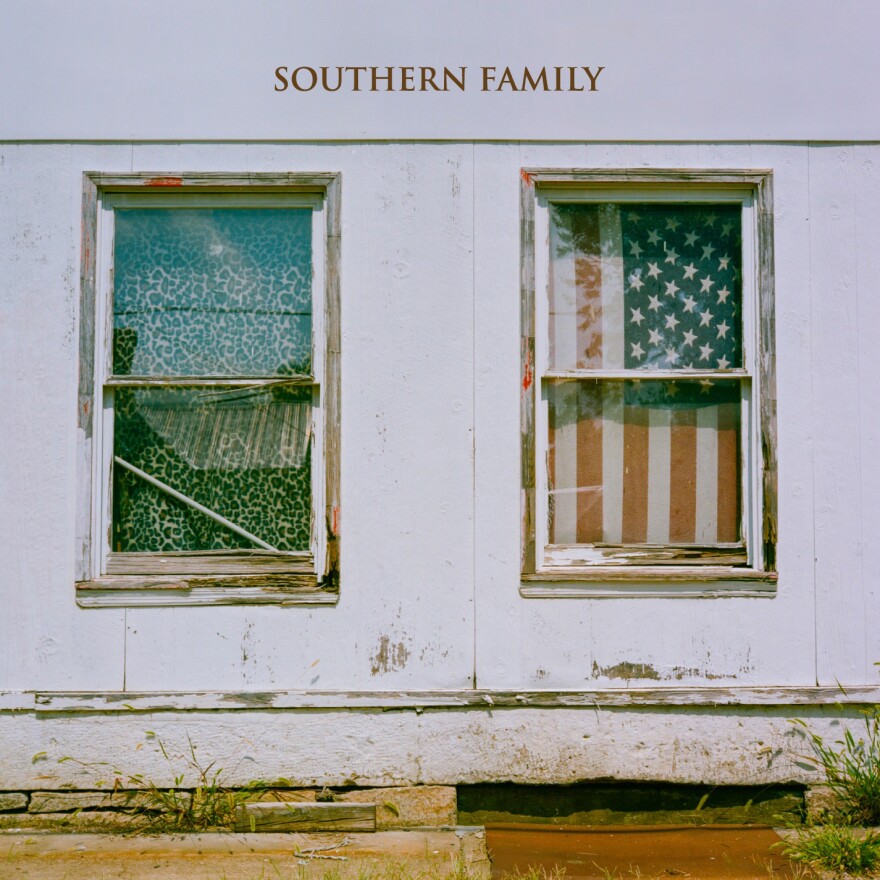Note: NPR's First Listen audio comes down after the album is released. However, you can still listen with the Spotify playlist at the bottom of the page.

The finest country songwriters understand that the best way to a big idea is often through a small detail. Consider the central gesture that dictates the action in Brandy Clark's beautiful song "I Cried," which appears on producer Dave Cobb's graceful compilation album Southern Family. Contemplating a grandfather's death and his wife's ensuing loneliness, Clark builds the song's chorus around the phrase, "I cried," her voice arching up into a tender, transcendent falsetto; in the next line, she takes the mood down again. "I tried to hold my head high, it ended up in my hands." That simple image so effectively captures the experience of living with grief: the attempt to show strength for others, for your own sanity, and the gradual, quiet, repetitive sag into vulnerability. Who hasn't experienced this moment at a funeral — or, as Clark describes, while simply talking on the phone with a fellow loved one left behind? There's no need for an angel's trumpets here. "I Cried" says more about mortality with a sigh.
Southern Family collects such moments in a bouquet of memories and treasured sentiments, in the process coalescing into one of the subtlest concept albums to ever bear that dangerously pretentious descriptor. Inspired by the 1979 album White Mansions, a song cycle about the Civil War spearheaded by the writer Paul Kennerly and produced by Glyn Johns, Cobb's own effort doesn't adhere to a linear narrative the way its predecessor does. It's more like the way we tell tales now, in dialogue across social media, our individual experiences adding up to a collective portrait of our times.
Mainstream country stars and Americana favorites show why those separate categories are increasingly meaningless — at least in Cobb's world, where a strong composition and an unfussy live arrangement always get to the core of things. Miranda Lambert's hymnlike "Sweet Bye And Bye" complements Jason Isbell's righteous "God Is A Working Man" (a great campaign song for the right candidate, by the way). "Mama's Table," a perfect ballad Jamey Johnson originally wrote for the Oak Ridge Boys and himself sings here, gets an answer from Zac Brown in "Grandma's Garden." John Paul White offers his own funeral confession in the heartrending "Simple Song 1," while Anderson East confronts another life passage — parents' divorce — in "Learning." Alongside offerings by Holly Williams, Morgane and Chris Stapleton, Shooter Jennings, the excellent newcomer Brent Cobb (cousin of Dave), and Rich Robinson (who brings gospel into the mix via the Settles Connection chorus in the grand closer "The Way Home"), these songs ground place and community in the experience of the everyday: a kid's bottle of Cheerwine, a brother's initials carved in Grandma's table, an old song that means something different when you sing it in nursery school and, later, to your own child.
Hotly anticipated as Dave Cobb's grand statement about the generation of mostly Southern artists who, with his help, are shifting the definitions of both country and Americana music, this collection succeeds by being as modest as its helmsman. "Southern" and "family" are both fraught terms — as are "country" and "Americana" — but instead of trying to clearly define them, Cobb (who plays guitar in nearly every track) encouraged his collaborators to approach them gently. The 12 resulting songs reflect family structures that are in flux but which endure because of love and memory, in a South constructed at backyard parties and in mothers' kitchens more than in any legislature or historical site.
Southern Family also reflects the eclecticism of the music that's long emanated from Nashville and its environs. Clark's track, enhanced by pedal steel and Mellotron, is high countrypolitan class; East's has the Muscle Shoals swagger he's made his trademark. Lambert invokes the Southern gospel her song title recalls. Brent Cobb gets swampy in the comical "Down Home," while White finds the place where folk music meets The Beatles. Bluegrass and blues and righteous Southern rock all find a place here. More than anything else, Southern Family is an argument for tradition as an organic concept, not an imposed one. Family is in the details, and to capture those details we have to listen to each other and accept the joy, the pain and the differences.
Copyright 2022 NPR. To see more, visit https://www.npr.org.





